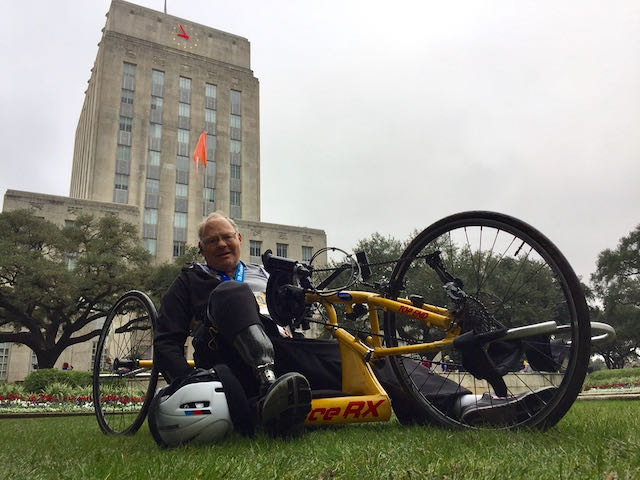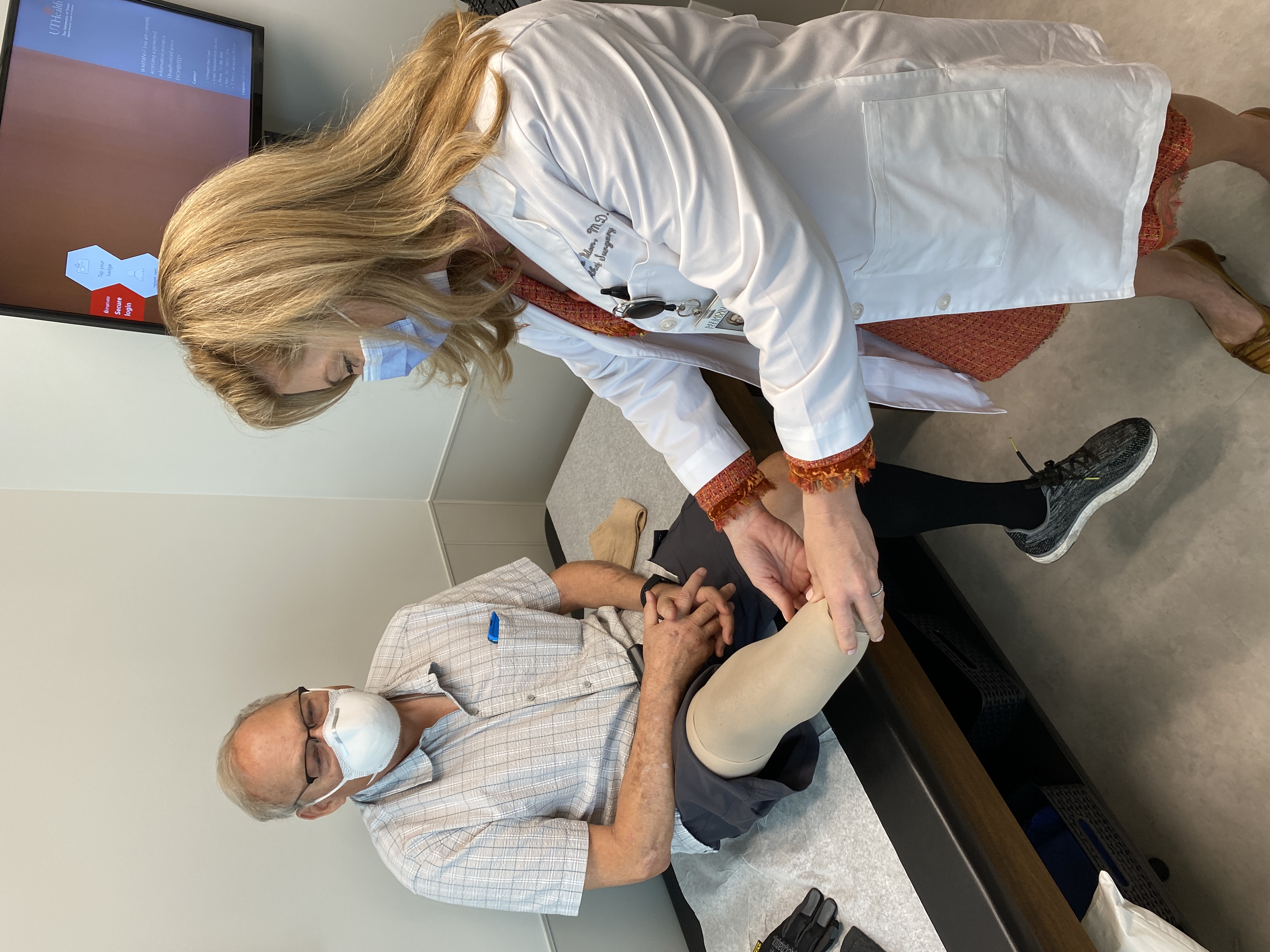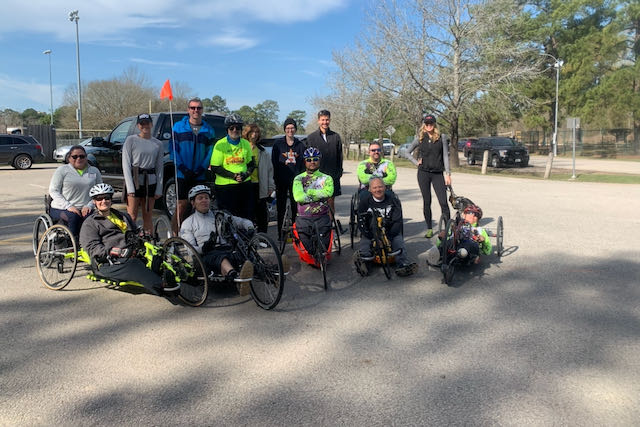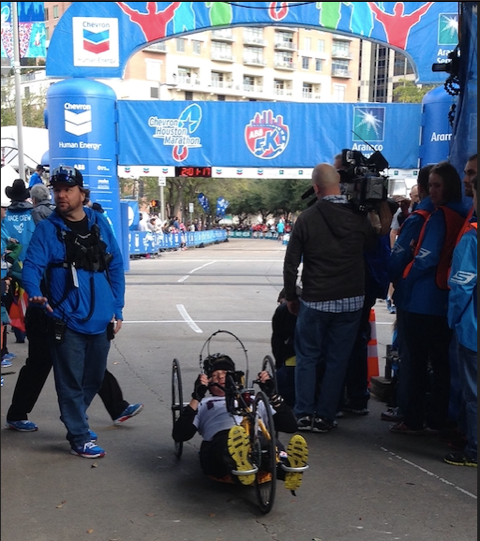Nothing discourages this unstoppable marathoner on wheels
Fred Samuelsen marvels that he has completed 13 marathons.
No big deal some may think, but Samuelsen is proud that he competes in what he calls a “very cool” wheelchair.
His journey to a wheelchair began 11 years ago when he broke his leg at home. Because of the twisting force of the break, it is called a spiral fracture, and it was a devastating injury complicated because Samuelsen had been insulin dependent for six decades.
In consultation with his doctor at the time, the decision was made to amputate his right leg below the knee.
After surgery and recovery, Samuelsen’s poorly-fitting prosthesis was cutting into his leg, causing a serious wound.
He found a beacon of light after his endocrinologist recommended he see Danielle Melton, M.D., associate professor in the Department of Orthopedic Surgery at McGovern Medical School at The University of Texas Health Science Center at Houston (UTHealth).
Dr. Melton’s specialty is nonsurgical management of patients with limb-salvage and amputation, encompassing pre-prosthetic or bracing management, prosthetic design and prescription, rehabilitation and pain management.
Samuelsen has been a patient of Dr. Melton’s for eight years and he has nothing but the highest admiration for Dr. Melton and her team. “She is a master of people and prostheses and she totally deserves her remarkable reputation. ”
With Dr. Melton’s care and support, he made progress right away. Dr. Melton prescribed physical therapy and “that effort helped me get rid of some bad habits, like the way I walked.”
“Living with limb loss is challenging,” admits Dr. Melton. “Our team embraces the opportunity to make people with amputations feel whole again.”
“Dr. Melton’s entire team is knowledgeable and helpful, and I recommend patients to her all the time,” said Samuelsen.
Encouragement was a game-changer
Not surprisingly, Samuelsen is very goal oriented. “Dr. Melton encouraged me to work on certain goals like improving my gait,” said Samuelson. “She explained the importance of managing certain maneuvers, considered gateway performance.”
Samuelsen appreciates Dr. Melton’s willingness “to battle for her patients and to get us what we need. She makes sure I have the best prosthesis that’s right for me. Over time, my limb and fitness level have improved.” An ongoing relationship with Dr. Melton allows Samuelsen and Dr. Melton to ensure that he continues to have a good fit and the right prosthetic to remain active. “She works closely with my prosthetist to optimize my leg,” he added. “I now have a below-knee vacuum prosthesis and it’s lighter and smaller and that helps me have a better gait.”
In fact, Samuelsen has no limp. “My gait is normal, and no one notices when they walk with me. With Dr. Melton’s encouragement, I started walking more. I used to walk about 500 steps a day, but I kept pushing myself and last year I walked 2,720 miles. In fact, my overall health has improved and I lost 40 pounds.”
He describes his wife, Cathy, as “my chief encourager who doesn’t let me have any pity parties.” A former registered nurse, Cathy switched gears and earned a Master’s degree and a Ph.D. in applied mathematics.
“She and Dr. Melton encouraged me to join the Houston Chapter of Achilles International and participate with them in weekly workouts,” he said. “The group enables people with all types of disabilities to embrace challenges and support each other by participating in mainstream running events. I’ve been in the group since 2013 and was one of five Achilles’ athletes who became the first to participate in the Houston Marathon in handcycles in 2015.”
Laughing, he confessed, “I don’t care what place I finish – just that I finish. I use a handcycle – a specialized wheelchair that has gears like a bicycle, and is powered by my arms, rather than my legs.”
A retired high school and junior high teacher who taught woodworking, history, and power mechanics for 34 years, he now loves to watch the sunrise and start his day with a 5 to 7 mile walk around his neighborhood. “I love to listen to the sounds of the world and soak up the beauty around me.”
From grief to hope
Samuelsen learned that with limb loss there is an early grieving stage. “This is a natural phase, but it is not a final destination. Patients need to pass through it, and many aren’t able to do that. If you’re disabled, you need hope that you can take on this disability and make the most of your life.”
Samuelsen was able to move past a low point of grief through encouragement from his wife, Dr. Melton, and her team. “There was a time I wondered if I’d ever walk much again.”
Today, Samuelsen doesn’t look at himself as someone who is handicapped, “and no one perceives me as handicapped.”
He is now a peer visitor with the Amputee Coalition, a nationwide non-profit group that empowers people affected by limb loss to reach their full potential. “I enjoy meeting with amputees to encourage them that there is hope at the end of the tunnel.”
Another reason he respects Dr. Melton is that “she gives patients hope,” he said. “And people live on hope.”